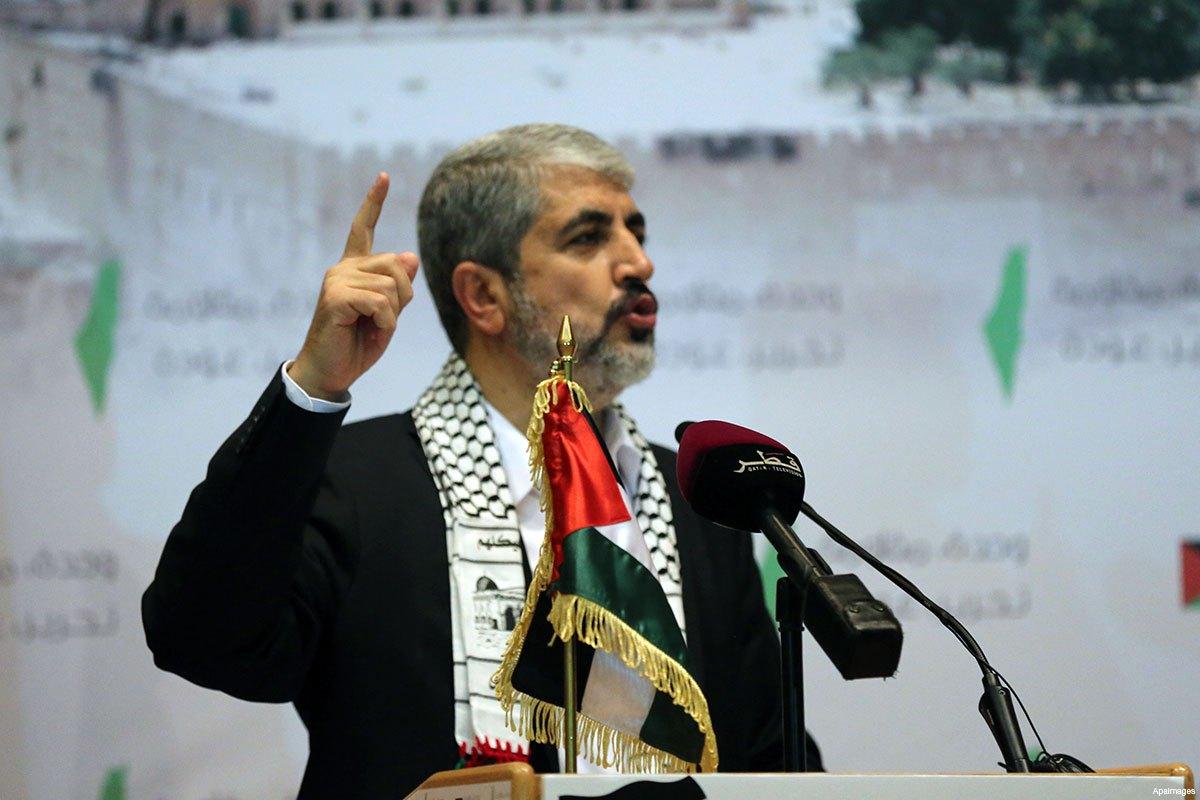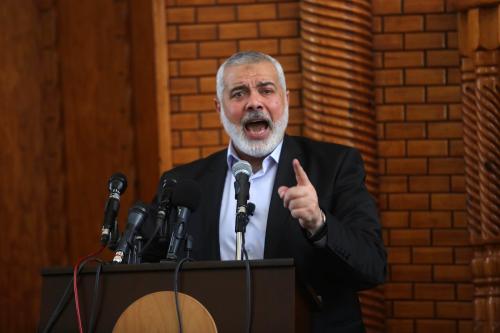Hamas considers Malaysia its gateway to Asia

In recent months, Malaysia has witnessed a series of successive visits by high-ranking delegations from Hamas, indicating the growing ties between these two parties at a time when the movement is facing a tight political siege by many Arab countries
Hamas’ most recent visit to Malaysia late last month came under the chairmanship of its former head of office, Khaled Meshaal. The program was crowded with meetings between Hamas’ leaders, the Malaysian government and opposition political leaders, in a rare scene among the movement’s visits to various countries.
Hamas started its visit to Malaysian capital Kuala Lumpur by meeting with Prime Minister Mahathir Bin Mohamad, as well as then Interior Minister and Head of the Malaysian United Indigenous Party (Bersatu Party), Muhyiddin Yassin, and Defense Minister Mohamad Bin Sabu.
The group also met with Head of the People’s Justice Party, Anwar Ibrahim, Head of the opposition United Malays National Organisation (UMNO) Party, Ahmad Zahid Hamidi, Leader of the Malaysian Islamic Party Abdul HadiAwang, Minister of Federal Territories Khalid Abdul Samad, and Deputy Minister of Foreign Affairs Marzuki Yahya.
In his highly-publicised meetings, Meshaal discussed the challenges the Palestinian people are currently facing, among which are Israeli violations against Jerusalem, the expansion of illegal settlements in the occupied West Bank, and the Gaza Strip’s ongoing siege.
Hamas’ delegation also discussed with its Malaysian hosts the “deal of the century”, considering it a plan to undermine the Palestinian cause. The visit resulted in positive outcomes, the most important of which was Malaysia’s offering of 140 scholarships for Palestinian students to attend 13 Malaysian universities, at a cost of $3 million.
A long history of relations
Prior to Meshaal’s visit, Head of Hamas’ Political Bureau Ismail Haniyeh contacted Prime Minister Bin Mohamad in January to emphasise the importance of the bilateral relationship between Malaysia and Palestine in general and Hamas in particular. He praised Malaysia’s support for the Gaza Strip and pointed to Mahathir’s speech at the United Nations – which held Israel responsible for the problems in the Middle East – as well as commended the prime minister’s commitment to the Palestinian cause and Malaysia’s rejection of normalisation with Israel.

Chairman of the political bureau of Hamas, Ismail Haniyeh speaks during the funeral of Palestinian teenagers Louay Kahil and Amir Al-Namara, who were killed in an Israeli air strike at a mosque during their funeral in Gaza City on 15 July, 2018 [Ashraf Amra/Apaimages]
In July 2017, a delegation of Hamas leaders concluded a series of meetings with Malaysian government officials and party leaders. The delegation was headed by senior representative of Hamas in Lebanon, Osama Hamdan, who met Malaysian Deputy Prime Minister Ahmad Zahid Hamidi. Both discussed the developments of the Palestinian cause and Malaysia’s support for the Palestinian people.
The delegation also held a meeting with the Secretary General of the ruling UMNO party, Minister Tengku Adnan Mansor, as well as a meeting with Head of the Malaysian Islamic Party and Vice President of the International Union of Muslim Scholars, Sheikh Abdul HadiAwang. In addition, another meeting was held with the leadership of the National Mandate Party and representatives of Malaysian civil society and NGOs.
Hamas’ delegation also participated in the closing ceremony of the Fourth World Assembly of the Unity of the Nation, organised by the Malaysian Islamic Party in the city of Kota Bharu in the north-eastern state of Kelantan. Hamdan delivered a public speech attended by tens of thousands of people.
In December 2016, Hamas leaders participated in UMNO’s annual general conference. There they met with government and local officials, as well as representatives of civil society organisations. The Malaysian officials were briefed on the latest developments in Palestine, discussing ways to support the Palestinian people and praising the bilateral relationship between the movement and the party.
In December 2015, Meshaal arrived in Kuala Lumpur heading a delegation of the movement’s leadership, at the official invitation of the Malaysian ruling party to attend its annual conference. The delegation’s program included official and popular visits and a speech by Meshaal.
Hamas’ first visit to Malaysia was in December 2013, during which a senior Hamas delegation led by Meshaal held official meetings with the Malaysian Prime Minister and the foreign affairs and interior ministries. The delegation also participated in a key speech at the International Forum of the ruling party, as well as another speech at the International Islamic University in Malaysia, in the presence of a large number of academics and members of the Arab and Islamic communities.
Popular support for Palestine
Muslim Imran, a well-known Palestinian figure living in Malaysia for 15 years, runs a Palestinian organisation in the country and is one of the key figures behind Malaysia’s relationship with the Palestinians. Malaysia’s support for Palestine has been strong historically, with thousands of Malaysians demonstrating throughout the country condemning any Israeli aggression against Palestinians.
During the 2014 Israeli assault on Gaza, one Malaysian village named its bridge after Gaza; the Palestinian flag has been raised in the village since 2008. The Malaysian Youth and Sports Minister, Khairy Jamaluddin, changed the program of his official visit to the UK during the 2014 war, instead taking part in a march through UK capital London to condemn the assault.

Rescue workers search for victims after air strikes hit Gaza during the 2014 Israeli offensive against Gaza [Ashraf Amra/Apaimages]
Then Prime Minister of Malaysia, Mohammad Najib Razak, arrived in Gaza in January 2013, shortly after the 2012 war Israel waged on the already-besieged Strip. He expressed regret over the assassination of Hamas military commander Ahmed Jabari during the war and laid the foundation stone for one of the buildings bombed by the Israeli army, which was at that time being reconstructed.
Malaysian Minister of Domestic Trade and Consumer Affairs, Ismail Sabri, announced the closure of his account at HSBC and shared footage of him cutting up his bank card, in a move to denounce the bank’s closure of accounts belonging to advocates of the Palestinian cause. Malaysian delegations also continued participating in the convoys aimed at breaking the siege on Gaza, as well as contributing to a number of reconstruction projects in Gaza such as the Indonesian hospital, mosques and others.
Former Malaysian Deputy Prime Minister, Ahmad Zahid Hamidi, inaugurated the “Save Jerusalem” campaign at the largest mosque in Putrajaya – Malaysia’s federal administrative centre – with the participation of 27 representatives belonging to Islamic and human rights organisations.
The Malaysians’ support and advocacy campaigns ranged between demonstrations, lectures, conferences and fundraising for Palestinians. In 2014, Mahathir Mohamad – who was outside the government at that time – launched an international tribunal in Kuala Lumpur to try Israeli war criminals for their crimes in Palestine and Lebanon.
Looking forward
Relations between Hamas and Malaysia have accelerated in recent years in an unmistakable way, given that the Malaysian government’s hosting of delegations of the Resistance Movement repeatedly reflects a clear recognition of its role and activities as a legitimate resistance group.
Hamas considers these official communications with Kuala Lumpur an opportunity to encourage Malaysia’s role at the regional, Islamic and international levels in supporting the Palestinian cause, lifting the siege on Gaza and ending Israeli violations in Jerusalem and the West Bank.
All this means that there are close, strong ties that link Malaysia to the Palestinian issue in general and Hamas in particular. This prompted Mahmoud Al-Habbash, the Palestinian justice judge who is close to Palestinian President Mahmoud Abbas, to invite Malaysia, during his visit in late May, to support reconciliation with Hamas and use its influence in the movement to put an end to division between the Palestinian factions.
On the other hand, Israel is not satisfied with the thriving relations between Malaysia and Hamas. This sense of discontent was manifested in the assassination of Engineer Fadi Al-Batsh, a Hamas military leader in Kuala Lumpur in April 2018, on charges of manufacturing rockets.
Israel used the assassination of Al-Batsh to create an atmosphere of anxiety among Hamas cadres in Malaysia. It regularly refers to what it calls the Malaysia-Turkey-Hamas axis which, Israel claims, recruits Palestinian academics from the movement to study and receive training, before going back to the occupied Palestinian territories to build military infrastructure and sleeper cells which can be summoned when needed.
The Malaysian government denies these Israeli accusations and confirms that its assistance to the Palestinians is limited to political and humanitarian needs, through the Zakat committees and financial aid provided to the Palestinians.
Finally, it can be concluded that this series of visits by Hamas leaders to Malaysia, and the presence of clear Malaysian imprints in the field of humanitarian assistance in the Gaza Strip, clearly indicate the desire of the two sides to strengthen their bilateral relations.
The thriving relations between Hamas and Malaysia raise Israeli objections and uneasiness towards some countries in the region, which want to continue to besiege Hamas politically. This is especially relevant in view of the fact that Malaysia’s positions are consistent with influential countries in the region, leading to the establishment of a growing axis that consists of Qatar, Turkey and Iran. All these countries share strong and close relations with Hamas.
The views expressed in this article belong to the author and do not necessarily reflect the editorial policy of Middle East Monitor.
Source: Middle East Monitor

WRITE YOUR COMMENT